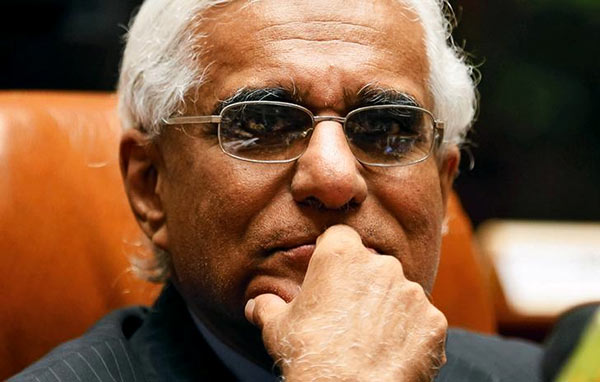Sri Lanka’s economic growth around 3 percent in 2018 – Central bank chief
Posted by Editor on February 22, 2019 - 5:07 pm

Sri Lanka’s economic growth was around 3 percent in 2018, the lowest since 2001, Central Bank Governor Indrajit Coomaraswamy said on Friday.
“The 2018 economic growth was around 3 percent, well below the potential growth of 5 percent,” Coomaraswamy told reporters at a post monetary policy rate review briefing in Colombo.
Earlier on Friday, the central bank reduced commercial banks’ statutory reserve ratio (SRR) by 100 basis points in a surprise move to increase liquidity and boost credit growth as policymakers struggle to support the economy following a political crisis and a recent rate increase.
(Reuters)

Latest Headlines in Sri Lanka
- Sri Lanka to introduce freelancer registration system for banking and financial benefits March 11, 2025
- Sri Lanka’s ‘Clean Sri Lanka’ school renovation project progresses with Tri-Forces support March 11, 2025
- Open warrant issued against IGP Deshabandu Tennakoon March 11, 2025
- Sri Lanka President holds key discussion with Excise Department officials March 11, 2025
- Three new Appeal Court Justices sworn in before President March 11, 2025



Nodakin. thu
In 2001, economic growth was stunted by the LTTE attack on the International Airport.
In 2018, economic growth was stunted by the Palace coup which brought a corrupt family into political leadership through the backdoor.
One man whom a majority trusted and gave responsibility on 08 Jan 2015, cut our throats without mercy.
The economic growth achieved in 2018 (3%) is well below the potential rate of growth.
There is clearly an output gap.
An increasing population adds labour to the economy; this is known as labour augmentation. Economic growth is driven by labour augmentation.
Increasing labour is a demographic dividend and SL is failing to capitalise on the demographic dividend.
The increasing labour is predominantly accommodated within the public service as Politicians consider jobs for their constituents as a key performance indicator.
The Public Service is totally unproductive and over-employed.
The alternative way of increasing productivity is through achieving productivity gains through innovation and doing things in more efficient manner.
The entrepreneurial program being promoted by the UNP may result in increasing economic growth.
There should be a corresponding ban on public and semi-public sector employment and a further step in downsizing the public sector.